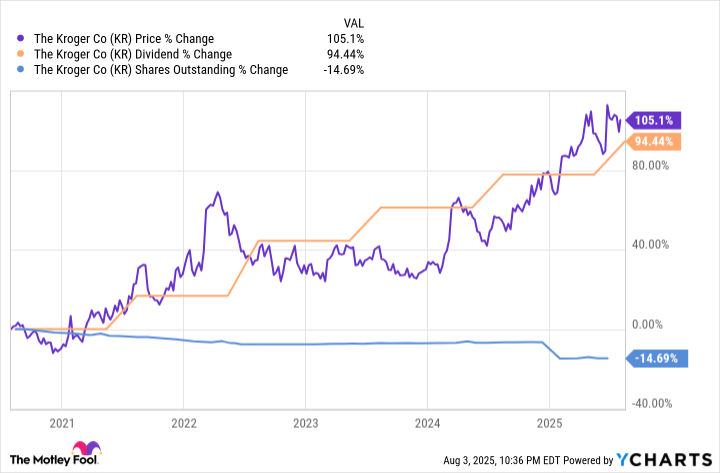All good things must come to an end. After six decades generating fortunes for Berkshire Hathaway's (BRK.A +0.28%) (BRK.B +0.20%) shareholders, Warren Buffett will soon relinquish his role as CEO of the trillion-dollar masterpiece of American capitalism he helped build.
Fortunately, Buffett plans to remain chairman of Berkshire's Board of Directors and continue to help guide the company's major investment decisions. Better still, the legendary financier's best ideas continue to comprise the lion's share of the conglomerate's public stock holdings, currently valued at a staggering $280 billion.
If you'd like to profit alongside Buffett, here are some of Berkshire's best stocks for today's turbulent economic environment.

Warren Buffett. Image source: The Motley Fool.
1. Kroger
When people pinch pennies, they dine out less and dine in more. The eat-from-home trend is a boon for Kroger (KR +1.12%), the largest pure play grocery chain in the U.S.

NYSE: KR
Key Data Points
With over 2,700 stores and roughly $150,000 billion in annual revenue, Kroger's impressive scale provides it with significant advantages over its smaller rivals. The grocery giant's purchasing power gives it an edge in pricing that cash-strapped consumers appreciate. Kroger can also afford to invest more aggressively in technology, which helped to fuel a 15% jump in the company's digital sales in the first quarter.
All told, Kroger is the type of investment that will allow you to sleep easily at night while you own it. People need to eat, and the grocery leader's defensive business model generates consistent profits across economic cycles. Moreover, Kroger's bountiful free cash flow -- which management expects to climb as high as $3 billion in 2025 -- supports a steadily growing dividend and sizable share repurchases. These cash returns should continue to drive Kroger's stock price higher in the coming years.
2. Coca-Cola
Long-time Buffett favorite Coca-Cola (KO 0.06%) is another reliable dividend stock to consider adding to your diversified investment portfolio. The beverage colossus has increased its cash payments to shareholders for an extraordinary 63 consecutive years.

NYSE: KO
Key Data Points
If you're worried about Coca-Cola's reliance on sugary soda sales, fear not. The beverage king has worked to broaden its offerings to include healthier fare like milk, tea, and bottled water. Strong sales of high-protein drinks under the company's popular Fairlife brand are a notable growth driver. Coca-Cola Zero Sugar and other sugar-free drinks also remain top sellers among health-conscious consumers.
Coca-Cola's diversified product lineup and strong free-cash-flow generation make it one of the most dependable dividend payers available in the stock market today. Buffett's beloved beverage maker is currently offering you a solid 3% yield.
3. Berkshire Hathaway
The most defensive and safest business of all, however, may just be Berkshire Hathaway itself. Buffett's financial fortress is sitting on a massive cash stash of more than $340 billion just waiting to be deployed in value-creating investments on behalf of its shareowners.

NYSE: BRK.B
Key Data Points
Berkshire's huge cash reserves enable it to pounce on profit opportunities as they arise. This typically occurs during volatile times. Buffett fans know this, which is one of the reasons why Berkshire's stock tends to outperform during bear markets.
The megaconglomerate's diverse business segments further help to reduce the risks for investors. Berkshire owns more than 60 operating subsidiaries in areas as far-ranging as railroads, car insurance, ice cream, and underwear. BNSF Railway, GEICO, Dairy Queen, and Fruit of the Loom are just a small sample of Berkshire's assorted holdings. Together, these businesses cranked out over $10 billion in operating cash flow in Q1 alone.
Although Buffett is stepping down as CEO at the end of 2025, he's handing over the reins to his hand-picked successor, Greg Abel. The longtime Berkshire executive isn't expected to rock the boat, as he's already overseeing many of the company's most important businesses. And the limited number of changes expected to come under Abel's leadership could prove beneficial. For example, Abel might be more aggressive with selling off Berkshire's few underperforming assets, such as its multibillion-dollar stake in Kraft Heinz. That could further swell the investment giant's already enormous cash reserves, thereby giving Berkshire even more capital to deploy during the next market downturn.








